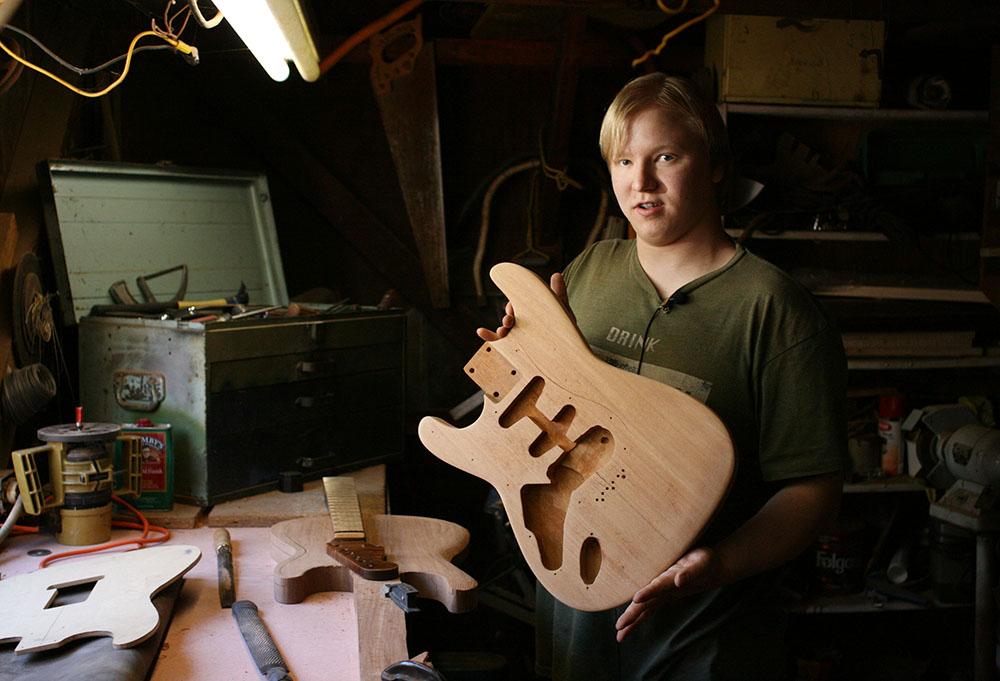
While most students are recovering from an all-night homework marathon, 22-year-old Evan Kelsay starts his day at 6:30 a.m., sanding, cutting and repairing guitars. Sawdust clouds the air in his small workshop as he systematically completes each task, never losing his intent expression.
Kelsay owns and operates Apocalypse Guitars from his workshop in Paradise, where he was born and raised, and his home in Magalia. The business is about a year old and its latest project includes the production of a line of basses Kelsay will call “The Ulfberht,” in honor of the ancient Viking sword.
At the age of 16, Kelsay began playing a guitar built and strung for a right-handed player. Being left-handed, this presented a problem for Kelsay, who had to learn how to play “backwards.”
While left-handed guitars are not uncommon, they are often limited to specific models. So what does a guitarist do when he can’t find the ideal instrument?
If that guitarist is Kelsay, it’s simple: he builds one.
Just over a year ago, Kelsay finished crafting his first guitar for himself based on his own specs — a “lefty” guitar he still plays and tinkers with. Working from his grandfather’s shed, he has built four custom guitars for local musicians and repaired around 20.
“I do all kinds of repairs,” he said. “I have a 12-string acoustic Epiphone I had to put the neck back on. It was run over by a car.”
Building his first guitar was no easy task. He had done mild repairs but nothing close to building an entire guitar from scratch.
“I watched countless hours of videos about building guitars and read a bunch of books on it,” Kelsay said.
This was the beginning of Apocalypse Guitars, a small custom guitar and bass service shop created by Kelsay to cater to other players’ specific needs.
Kelsay has also become an electrician in terms of wiring guitars and pickups since the business’ inception.
“I do all the saudering, installing the hardware, everything,” he said. “That’s actually where I started out — electronics — because I wanted to switch the pickups in my Ibanez. That’s how I taught myself to do all that stuff.”
Kelsay is dedicated to using environmentally-conscious materials.
“I use Sapele wood, which is a plantation-grown tree in West Africa,” he said. “It’s very sustainable and consistent. The trees are all clones of each other, so it has consistency and stiffness and is sustainable. No deforestation.”
The custom guitars at Apocalypse Guitars are comparable in quality to those offered by major guitar companies, Kelsay said. And he can turn them out faster than most custom shops.
“I don’t think I would expand to Gibson-sized production … because I can produce a couple guitars in about a month, which is much faster than most custom shops,” he said. “Usually they have year-long waiting lists.”
But one of most important aspects of Kelsay’s business is the ability he has to communicate with customers on a personal level.
“I’ll go and talk to them to figure out what they want, which not a lot of custom shops do,” he said. “I know of one in Australia (that does that), but none around here.”
Kelsay said he has every intention to expand his budding business to greater heights while maintaining the feel and customer service found at local shops.
“Once there is a market for me to expand, I’ll do it,” he said. “(I hope) to be regarded as a quality instrument maker and be able to continue to do this as a profession.”
Jake Hutchison can be reached at artseditor@theorion.com or @poserpunk on Twitter.




